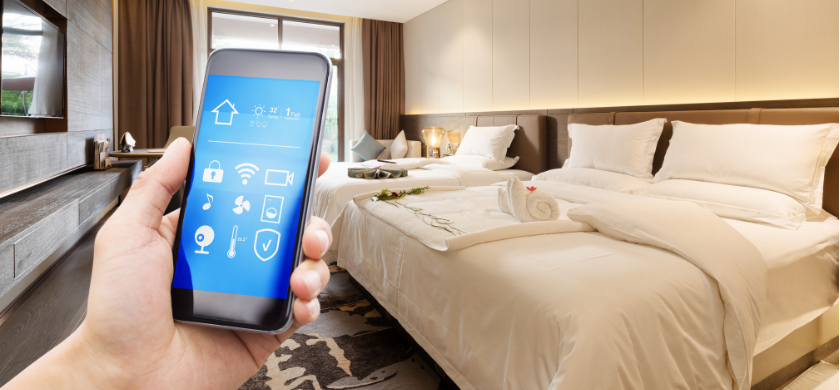Travelers are always looking to book hotels featuring unique, cutting-edge experiences. Advancements in hotel technology continue to provide innovative ways to boost guest conveniences. One such innovation guests have begun to look for in hotels are smart rooms.
How, then, do hotels implement smart rooms? We’ve compiled a list of some of the best ways to feature smart rooms in hotels, plus the technology needed for each solution.
What is a Smart Hotel Room?

Smart hotel rooms promise to be the future of guest accessibility in hotel rooms, leveraging Internet of Things (IoT) technology. Combining Bluetooth and WiFi capabilities, smart hotel rooms can connect travelers to their rooms in new and exciting ways, bolstering unprecedented, convenient control.
Hotel guests can access smart room capabilities by connecting via smartphone, tablet, smart speaker, or smart hub. Once linked, guests can use these devices as a control center for smart features. The list of amenities hoteliers can install in their smart hotel rooms is longer than you may expect.
5 Cutting-Edge Smart Room Ideas for Hotels

So what are the best ways to use hotel smart room technology? These five smart room ideas offer some of the highest utility to guests, solving inconveniences of standard hotel rooms. Additionally, several of these services can lead to positive ROI for hoteliers.
1. Intuitive Adjustments to Room Conditions
Traditional hotels have decentralized control over the environment of a room. Changes to temperature, lighting, and other conditions are accessible via separate devices, forcing guests to locate and operate multiple unique, often confusing interfaces.
Leveraging mobile apps, smart rooms offer responsive hubs for controlling room conditions. Guests can adjust thermostats, dim lights, or even adjust curtains within one centralized experience.
These controls add unprecedented accessibility to hotel rooms. Any guest can personally customize their room, without having to move around or operate an unfamiliar device. As such, smart rooms can save guests time, hassle, and discomfort.
2. Controlling In-Room Entertainment
As the entertainment industry evolves, so do guest expectations for In-Room Entertainment. Modern travelers already have access to diverse entertainment options at home. Additionally, these entertainment options are all watchable and controllable from multiple devices. Hotels need to match this level of connectivity in order to satisfy guests.
In smart rooms, guests can access their content with ease. Using casting technology, travelers can connect their streaming accounts to hotel televisions through their own devices, eliminating the hassle of logging on again. Smart room casting lets guests watch whatever content they please, whether streamed or downloaded.
Similar to innovations in room conditions, smart rooms also allow guests to control their In-Room Entertainment using smartphone applications. Guests in smart rooms can turn their TV on and off, change the channel, and control streaming services such as Netflix and Hulu.
3. Streamlined Interaction with Guest Services
Smart rooms also simplify communication with guest services. Whereas visitors would typically have to call guest services through a hotel phone, smart rooms shorten the process with communication via designated, intuitive applications.
Smart rooms can even advertise amenities to guests. Modern In-Room Entertainment packages can showcase advertisements for hotel features. These include spa services, exercise classes, and room service for food and drink. Advertisements can also link guests directly to scheduling or ordering, offering instant conversions.
4. Interactive Hotel Mapping
Televisions in smart rooms can offer additional convenience to guests by serving as a hub for digital wayfinding. Hoteliers can upload interactive hotel information to In-Room Entertainment consoles; these allow guests to explore your hotel’s features via their TV remote or smartphone.
Hotels can also combine wayfinding with turnkey advertising and booking for a holistic hotel exploration experience. As guests approach virtual storefronts, they can access instant booking for that location. Once integrated, this technology lets guests know how, when, and where to get the amenities they crave.
5. Sustainability Through Automation
Beyond guest convenience, smart rooms provide extensive capabilities for sustainability. Automation in smart rooms can help to both cut down on hotel operating costs and benefit the environment.
Monitors in Smart Rooms can detect when a guest leaves their room and adapt room conditions accordingly. Sustainability automation can dim or turn off lights, adjust the thermostat setting to save energy, and more. With automation in place, hotels ensure they don’t waste valuable electricity on rooms that don’t need it.
Turn a Hotel Room Into a Smart Room With Hospitality Network Internet Connectivity
IoT powered smart rooms are the next evolution of luxury hotel rooms. These rooms present exciting new experiences for guests and substantial opportunities for hoteliers to raise their revenue. To implement smart rooms, however, hotels need a capable WiFi network to maintain smart functionality.
Hospitality Network is a leading provider of Hospitality IoT Technology. Our solutions offer reliable network connectivity to hotels, perfect for supporting and maintaining smart rooms. Request a consultation today and begin laying the foundation for smart rooms in your hotels.

